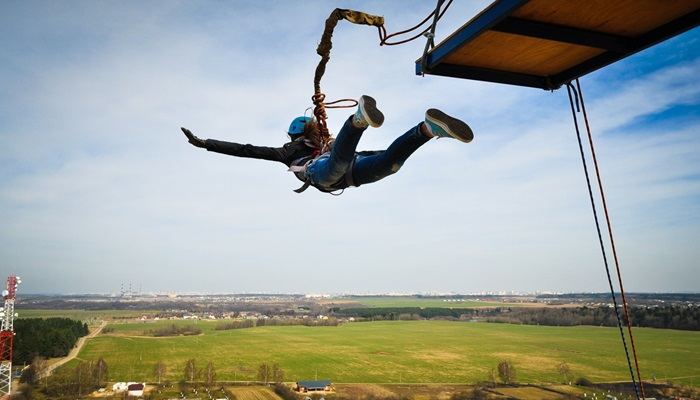Bungee jumping is an exhilarating sport that attracts thrill-seekers from all walks of life. The rush of free-falling from a great height, coupled with the adrenaline surge, makes it a unique experience. However, bungee jumping is not for everyone. While many people can safely enjoy this extreme sport, certain individuals should avoid it due to health risks, psychological factors, or personal circumstances. This article will explore who should think twice before taking the plunge into the world of bungee jumping.
Understanding Bungee Jumping
Before diving into who should avoid bungee jumping, it’s essential to understand what the activity entails. Bungee jumping involves leaping from a tall structure while connected to a large elastic cord. The thrill comes from the free fall and the rebound when the cord stretches and pulls the jumper back up. Jumpers typically leap from bridges, cranes, or specially designed platforms.
While bungee jumping is generally safe when conducted by professional operators with proper equipment, it still carries inherent risks. These risks can be amplified for certain individuals due to physical or psychological conditions.
Health Conditions to Consider
Cardiovascular Issues
Individuals with cardiovascular problems should think carefully before bungee jumping. The sudden rush of adrenaline can cause spikes in heart rate and blood pressure. For those with conditions such as hypertension, arrhythmias, or a history of heart attacks, this could lead to serious complications.
Neurological Disorders
People with neurological disorders like epilepsy or severe migraines should also refrain from bungee jumping. The intense physical experience can trigger seizures or exacerbate existing conditions. The sudden changes in altitude and pressure may also affect individuals with certain neurological issues.
Pregnancy
Pregnant women are advised against bungee jumping for safety reasons. The physical stress and potential for injury during the jump could pose risks to both the mother and the unborn child. Even if a woman has been cleared for physical activity during her pregnancy, bungee jumping is an extreme sport that should be avoided.
Musculoskeletal Injuries
Individuals with pre-existing musculoskeletal injuries or conditions such as osteoporosis should avoid bungee jumping. The impact during landing and the forces exerted on the body can aggravate these injuries or lead to new ones. Those recovering from surgeries or fractures should also wait until fully healed before considering such activities.
Obesity
Obesity can pose additional risks during bungee jumping. Many operators have weight limits due to safety concerns regarding equipment integrity and the physical demands of the jump. Excess weight can increase the likelihood of injury during the jump and landing phases.
Psychological Factors
Fear of Heights (Acrophobia)
Acrophobia, or fear of heights, is a common issue that can make bungee jumping an unpleasant experience rather than an exhilarating one. Individuals who suffer from this phobia may find themselves paralyzed by fear when faced with the prospect of jumping from a high platform. This fear can lead to panic attacks and other anxiety-related symptoms.
Anxiety Disorders
Those with anxiety disorders may also struggle with the intense emotions associated with bungee jumping. The anticipation of the jump can trigger anxiety attacks or overwhelming feelings of panic. It’s crucial for individuals with these disorders to assess their comfort levels before engaging in extreme sports.
Post-Traumatic Stress Disorder (PTSD)
Individuals who have experienced traumatic events related to heights or falling may find that bungee jumping exacerbates their PTSD symptoms. The act of jumping could trigger memories or feelings associated with their trauma, leading to emotional distress.
Age Considerations
Young Children
Most bungee jumping operators have age restrictions in place for safety reasons. Young children typically lack the physical strength and mental maturity required for such an extreme sport. Parents should carefully consider these factors before allowing their children to participate.
Older Adults
While many older adults are physically fit and adventurous, age-related health issues may make bungee jumping risky for some. Conditions such as arthritis, osteoporosis, or cardiovascular issues may increase the likelihood of injury during the jump.
Personal Circumstances
Recent Surgeries
Individuals who have undergone recent surgeries should avoid bungee jumping until fully recovered. The physical strain involved in jumping can jeopardize healing processes and lead to complications.
Substance Abuse
Jumping while under the influence of drugs or alcohol is extremely dangerous and highly discouraged. Substance abuse can impair judgment, coordination, and reaction times, increasing the risk of accidents during the jump.
Financial Constraints
Bungee jumping can be an expensive activity when considering costs such as travel, equipment rental, and jump fees. Individuals facing financial difficulties should prioritize their well-being over participating in extreme sports that may add financial strain.
Safety Measures And Alternatives
For those who meet health guidelines but still feel unsure about bungee jumping, there are alternative activities that provide similar thrills without some of the risks associated with bungee jumping:
Indoor Skydiving: This activity simulates free-fall in a controlled environment without the height associated with traditional skydiving.
Zip Lining: Zip lines offer a thrilling ride through treetops without the same level of risk as bungee jumping.
Trampoline Parks: These parks provide a fun way to experience jumps without significant heights or risks.
Rock Climbing: For those seeking adventure while staying grounded, indoor rock climbing offers challenges without extreme heights.
Virtual Reality Experiences: VR technology allows individuals to experience thrilling scenarios without physical risks.
Conclusion
Bungee jumping is an exciting sport that offers a unique thrill for those who are physically and mentally prepared for it. However, it is crucial to recognize that not everyone should participate in this extreme activity.
Individuals with specific health conditions, psychological factors, age-related concerns, or personal circumstances must carefully evaluate their readiness before taking the leap.
Related topics:
- How Long Does Bungee Jumping Last?
- Top 10 Bungee Jumping in Popular Destinations 2025
- Where Can I Go Bungee Jumping in The Us?

